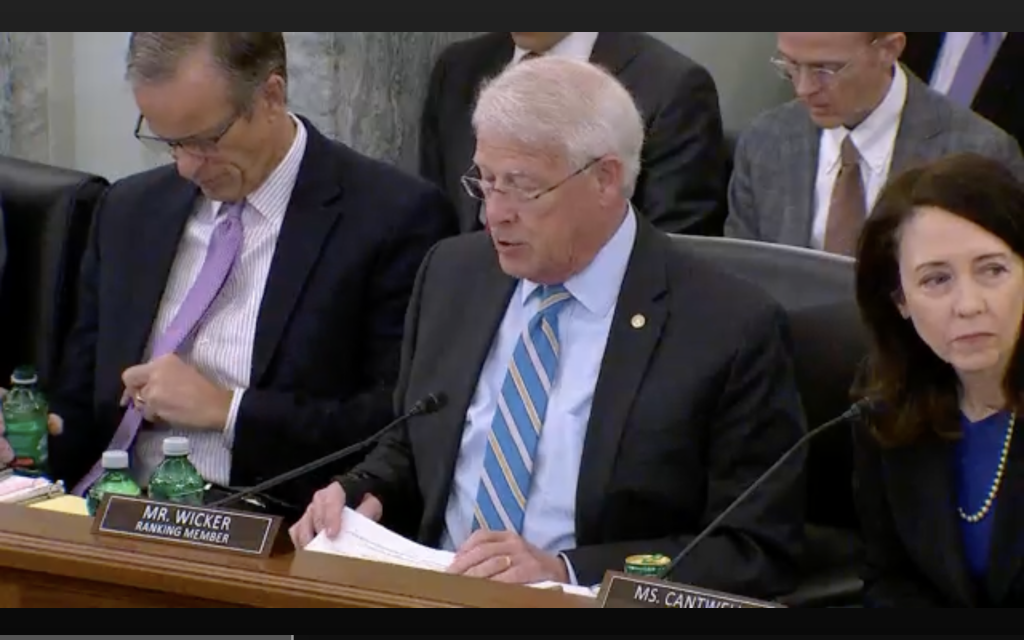“The U.S. Chamber said that Sohn’s ‘extreme views on issues on regulating broadband like a public utility, undermining intellectual property protections, and pursuing an agenda that would stifle competition’ would make achieving consensus difficult.”

Senator Roger Wicker (R-MS)
The Senate Committee on Commerce, Science and Transportation today voted 14-14 to advance the nomination of Gigi Sohn to serve as a commissioner with the Federal Communications Commission. Committee Ranking Member Senator Roger Wicker (R-MS) opposed the nomination, explaining that “the committee’s vetting process has clarified she’s not the right choice to fill this vacancy” due to several conflicts of interest. Groups including the U.S. Chamber of Commerce also vocally opposed Sohn’s nomination this week.
In December, Senator Thom Tillis (R-NC) wrote a letter to President Biden asking Biden to withdraw Sohn’s nomination, explaining that her role as a co-founder of the open Internet advocacy group Public Knowledge poses a threat to copyright owners in particular. “[Sohn] is a radical open-content activist with no respect for intellectual property rights,” Tillis wrote. “As an activist, Ms. Sohn has consistently worked against commonsense measures that would crack down on illegal piracy. She has even testified before Congress that ‘piracy has absolutely no effect on [music] prices whatsoever.’”
The U.S. Chamber’s letter, sent by Neil Bradley, Executive Vice President, Chief Policy Officer and Head of Strategic Advocacy to Commerce Committee Chair Maria Cantwell (D-WA) and Wicker, was similarly scathing. It said that Sohn’s “extreme views on issues on regulating broadband like a public utility, undermining intellectual property protections, and pursuing an agenda that would stifle competition” would make achieving consensus difficult. The Chamber noted it has supported other Biden nominees, including Jessica Rosenworcel’s as FCC chair, but called Sohn’s record on intellectual property particularly “alarming”. The letter referenced Sohn’s announcement that she would recuse herself from broadcast copyright and retransmission issues if confirmed to the FCC for the first three years of her term. In his remarks today, Wicker said this “only raises questions about the need for further recusals” and that the voluntary nature of the commitment “means it can be withdrawn or nullified in the future.”
The Chamber added that Sohn’s advocacy for “overly aggressive and combative regulation of the communications sector” evidenced by her support of the 2015 Open Internet Order, “which regulated broadband like a public utility under Title II of the Communications Act…led to the decline in private sector broadband investment for the first time outside a national economic slowdown.” Sohn has indicated in her “plan for action” that she still supports this approach and would impose even further requirements under Title II “such as service fees, which could lead to an even greater reduction in private sector investment and impose greater costs on consumers,” wrote the Chamber.
On the other hand, supporters of Sohn’s nomination argue that the criticism of her is unfounded and the calls for her recusal on certain issues a double standard. Free Press Action Vice President of Policy and General Counsel Matt Wood said in a statement last month: “Sohn represents a tie-breaking fifth vote at an FCC that has much to do to help create a more just, equitable and diverse U.S. media system. This includes ensuring the billions being invested in broadband actually reach those who need it most, restoring open-internet protections, reckoning with the agency’s history on race, and ensuring that all people have access to media opportunities, not just a handful of incumbents.”
The Committee also reported the nomination of Alvaro Bedoya for Commissioner at the Federal Trade Commission to the Senate floor in a tie vote. Republicans oppose Bedoya’s nomination, citing concerns about “divisive views on policy matters”. Wicker said: “There has been a troubling trend of politicization at the FTC which we have not had in the past, and I fear Bedoya would not bring the cooperative spirit that is so greatly needed.”

![[IPWatchdog Logo]](https://ipwatchdog.com/wp-content/themes/IPWatchdog%20-%202023/assets/images/temp/logo-small@2x.png)

![[Advertisement]](https://ipwatchdog.com/wp-content/uploads/2024/04/UnitedLex-May-2-2024-sidebar-700x500-1.jpg)
![[Advertisement]](https://ipwatchdog.com/wp-content/uploads/2024/04/Artificial-Intelligence-2024-REPLAY-sidebar-700x500-corrected.jpg)
![[Advertisement]](https://ipwatchdog.com/wp-content/uploads/2024/04/Patent-Litigation-Masters-2024-sidebar-700x500-1.jpg)

![[Advertisement]](https://ipwatchdog.com/wp-content/uploads/2021/12/WEBINAR-336-x-280-px.png)
![[Advertisement]](https://ipwatchdog.com/wp-content/uploads/2021/12/2021-Patent-Practice-on-Demand-recorded-Feb-2021-336-x-280.jpg)
![[Advertisement]](https://ipwatchdog.com/wp-content/uploads/2021/12/Ad-4-The-Invent-Patent-System™.png)






Join the Discussion
2 comments so far.
Pro Say
March 4, 2022 10:56 amTie votes should doom such nominations, not confirm them.
It says something if a bare minimum simple majority is unwilling to approve someone.
Something bad.
And in this case, very bad indeed.
The Biden administration continues to disappoint.
Anon
March 3, 2022 05:12 pm14 “D’s” on the committee, pursing an abject damaging choice.
Their purported argument as to HAVING a tie-breaking position is nothing but a smokescreen, as ANY non-activist “D” would provide exactly that same benefit.
And “D’s” wonder how Trump was elected…
By the way, those “D’s” are:
Arizona: Krysten Sinema
Colorado: John Hickenlooper
Connecticut: Richard Blumenthal
Georgia: Raphael Warnock
Hawaii: Brian Schatz
Illinois: Tammy Duckworth
Massachusetts: Ed Markey
Michigan: Gary Peters
Minnesota: Amy Klobuchar
Montana: Jon Tester
Nevada: Jacky Rosen
New Mexico: Ben Ray Lujan
Washington (Chair): Maria Cantwell
Wisconsin: Tammy Baldwin